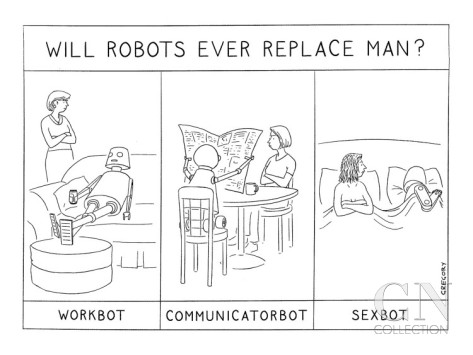This weeks robot thoughts take on a cheeky vibe (yes, I’ve started unapologetically early with the double entendres…) as I begin my final quarter before turning 40. My 30s started with the aim of bringing tech to sex (thank you Ann Summers), and I will embark on my 40s with the aim of bringing sex appeal to tech. What comes around algos around…
With Augmented/Virtual Reality (VR) set to reach a $150bn industry by 2020 we are seeing huge developments in the colourful world of technosexuality. Advances in wearable tech, combined with mind-blowing developments in materials, such as those used to create the Octobot lead us to some interesting questions about what it will mean to be intimate in the bedroom of the future.
So; what are your private thoughts about virtual reality sex (better than real) or augmented sex (a better real)? By looking at what can be synthesised it really challenges us to define what it means to be human. Further than that, what will it mean at the various stages of our life span, where sex and intimacy will mean different things to us.
During my time as Head of Training for Ann Summers I had the privilege of hearing and reading the heartfelt correspondence from women and couples who had re/discovered their sex life due to the help of our ‘intimate tech’. Surely a sex toy is the ultimate example of human/technology integration?
The history of vibrators is longer than some may think, so back in the 19th-century women were already experimenting with what I call the Carbon/Silicon Symbiosis! This is the term I use to describe how we need to create mutually beneficial, symbiotic relationships between us carbon-based humans, and our silicon-based technology. I’m not entirely sure the ‘Carbon/Silicon Symbiotic Pocket Lover’ would have made it out of a focus group as a product name, but you get my drift…
The domestic sex toy industry is a fascinating and enormous topic. Viewing it through my robot lens, part of the allure of sextech’s seduction is the fact that it can only deliver an optimal outcome and the user is in the driving seat at all times.
Conversely, sometimes our human bodies let us down (we are fallible beings after all), sometimes they don’t give accurate, ahem, feedback (just ask Harry as he met Sally) and sometimes they don’t call you the day after. For these (and a multitude of other) reasons a sex toy can provide an emotionally safer and physically more secure way for thousands of female customers to feel more human in that moment.
So. Does a (straight) woman need a physical man in her life any more?…

Isn’t it interesting how the dialogue in the press has revolved around Men vs Machine? (Warning: don’t Google ‘women vs machine’ whilst your kids or parents are around!) Furthermore, and this is slightly controversial, could an unintended consequence of tech invented, researched and developed within the male-skewed field of computing, be that the traditional ‘man-jobs’ are actually more at risk of automation than traditional ‘woman-jobs’?
Big questions.
Small anecdote: although women would write in sharing how their lives had been enhanced by their relationship with their new toy, I never once heard about anyone taking their Rampant Rabbit back home to meet the family! I think we can all agree that there are still some occasions where only another human will do.
In fact, some physical sensations do require another human. Apparently we cannot tickle ourselves; our brain’s cerebellum will predict a movement that we are in charge of and so will cancel out the tickle sensation. So if you were wondering what us humans might be doing in the bedroom of the future, it might revolve around tickling and hand-holding; back to first base as the drones deliver the breakfast. Anyone looking to invest in a ‘TickleBot’ should probably back out now.
In our intimate technology choices, as well as our industrial ones I suggest this: Why fight? We need to relate. No-one can run faster than a robot, so let’s not waste our energy trying to compete. Can a robot make eye contact, ask a poignant question and listen with full heart to the response quite like us humans? Not yet. So let’s direct our energy to this soft, wet stuff. We are 70% water-based after all.
The robots are coming, look busy [insert pun here]
Laura x




Leave A Comment